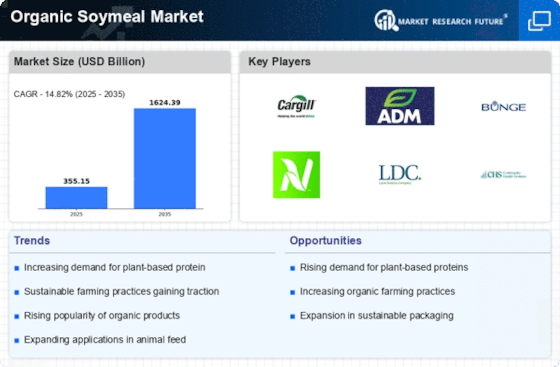Top Industry Leaders in the Organic Soymeal Market
 The Growing Green Feast: A Dive into the Organic Soymeal Market Landscape
The Growing Green Feast: A Dive into the Organic Soymeal Market Landscape
Spurred by rising health consciousness and environmental concerns, the organic soymeal market is experiencing a surge in demand. This niche within the larger soymeal industry, projected to reach a staggering $823.7 million by 2030, is witnessing a dynamic competitive landscape where established players rub shoulders with innovative newcomers, all vying for a larger slice of the organic pie.
Key Players and their Strategies:
At the forefront are established giants like Perdue Farms, Tyson Foods, and Pilgrim's Pride. These players leverage their extensive distribution networks and brand recognition to cater to large-scale livestock and poultry producers. Perdue Farms' "Organic Plus" line, for instance, offers non-GMO, antibiotic-free organic soymeal, catering to the demand for ethically sourced feed.
Meanwhile, smaller players like Sapthsathi Organic Agriculture Project and Soni Soya Products are carving their niche by focusing on direct sourcing from organic farms and building strong relationships with local farmers. Soni Soya Products' commitment to fair trade practices and sustainable farming resonates with environmentally conscious consumers.
Factors Shaping Market Share:
Beyond brand names, several factors influence market share analysis:
Product Differentiation: High-protein, defatted organic soymeal is gaining traction, especially for poultry and aquaculture feed. Companies like AFG Brasil are tailoring their offerings to cater to specific nutritional needs of different livestock.
Geographical Focus: Asia-Pacific, led by China and India, is expected to dominate the market with its large livestock populations and increasing disposable income. Companies like Grain Millers are actively expanding their presence in these regions.
Pricing and Supply Chain Challenges: Organic soymeal typically commands a premium price, making it susceptible to fluctuations in soybean prices. Building robust supply chains and optimizing logistics are crucial for cost-effectiveness and market penetration.
New Entrants and Industry Buzz:
The market is constantly evolving with new players and exciting developments:
Direct-to-Farm Partnerships: Startups like Barn2Door are disrupting traditional distribution channels by connecting organic farms directly with feed manufacturers, fostering transparency and traceability.
Innovative Processing Techniques: Companies like ADM are investing in advanced processing technologies to improve protein quality and reduce waste, making organic soymeal a more attractive option for cost-conscious producers.
Focus on Sustainability: Consumers are increasingly concerned about the environmental impact of soy production. Companies like The Organic Soy Initiative are promoting responsible farming practices and carbon neutrality initiatives to address this concern.
Investment Trends and Overall Competitive Scenario:
Venture capitalists are recognizing the market's potential, fueling investments in companies like Organic To Go and Nature's Harmony Foods. These investments are directed towards innovative processing technologies, direct-to-farm partnerships, and sustainable practices.
The competitive landscape is characterized by a mix of collaboration and competition. Established players are partnering with smaller companies to expand their organic offerings, while startups are leveraging their agility and consumer-centric approach to gain traction. The focus is shifting towards offering high-quality, ethically sourced, and sustainable organic soymeal to meet the evolving needs of both producers and consumers.
The organic soymeal market is a dynamic and promising space, driven by the growing demand for healthy, ethical, and sustainable feed options. As awareness of environmental and health benefits increases, this market is poised for further growth. The players who can adapt to changing consumer preferences, invest in innovative solutions, and prioritize responsible practices will be the ones who secure a larger share of this lucrative and evolving market.










